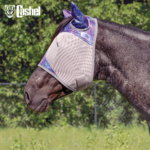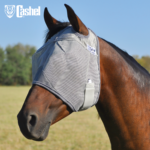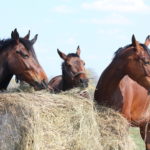I came across an interesting comment, stating that if we purchased premium grain instead of less-expensive choices, it would be cheaper in the long run, as we wouldn?t spend so much money on supplements. I sighed, noting that the comment appeared to have come from a major horse-feed producer. Our horses eat a high-quality feed.? However, they get about a pound of it each night during grazing months, just enough to mix supplements in it (much more in winter, of course).? And two of our three horses are fat; the other is normal weight. The package recommendation is that we feed about a half pound per 100 pounds of body weight just for maintenance (light work is even more). ?At maintenance, that would mean the fattest horse, who should weigh around 900 lbs., would be getting? over four times as much as I’m giving her now. About 4 ? pounds.? that’s way more calories than she needs! And this product is designed to be fed with hay, which she gets in addition to pasture. We’re blessed with excellent hay, and the pasture is good. However, we live in a low selenium area, so I know they need a little boost, and I supplement selenium with vitamin E.? Because of her high-risk profile for insulin resistance and laminitis (sHe’s Morgan), I also supplement magnesium (which seems to keep her neck from getting too cresty) and a joint nutraceutical.? (By the way, Horse Journal?s September issue starts a new series on equine arthritis by Dr. Grant Miller, including Adequan, Legend and joint supplements. Good stuff.) Since very few commercial concentrates/grains add joint nutraceuticals (way too expensive!) and few add magnesium, as most horses don’t have a magnesium deficiency or requirement for extra supplementation, I know I have to supplement both these things, too. All our horses also get a good hoof supplement, as I’ve learned that it also promotes healthy coats and general health. Just as an example for my point of this blog (that is, we do need to feed supplements), I want to talk about biotin, a main hoof nutrient we’re all familiar with. The product I feed contains 107 mg/lb. of biotin. The serving size (a half cup) provides 20 mg to the horse.? Horses need a minimum of ?15 to 20 mg per day of biotin, so I know I’ve got that well covered. (Grass and hay contain very low levels of biotin.) My feed contains .45 mg/lb. of biotin.? That means the pound of feed sHe’s receiving provides less than half of a mg of biotin.? To get her to 20 mgs of biotin, I would have to feed 40 lbs. of feed. The fact?is that most horses don’t need much grain or any grain at all. Unless your horse can’t hold his or her weight on hay/pasture alone, the amount of grain you feed should be just sufficient enough to hold your supplements or to give them a ?prize? for coming in the barn.?You could just use wet beet pulp as a carrier for your supplements, if you prefer. THere’s no reason to go crazy over supplements, but for the basic needs, they’re an easy, efficient?route. that’s one of the reasons Horse Journal covers so many different types of supplements and makes specific recommendations of the best ones throughout the year. Our horses need supplements.





